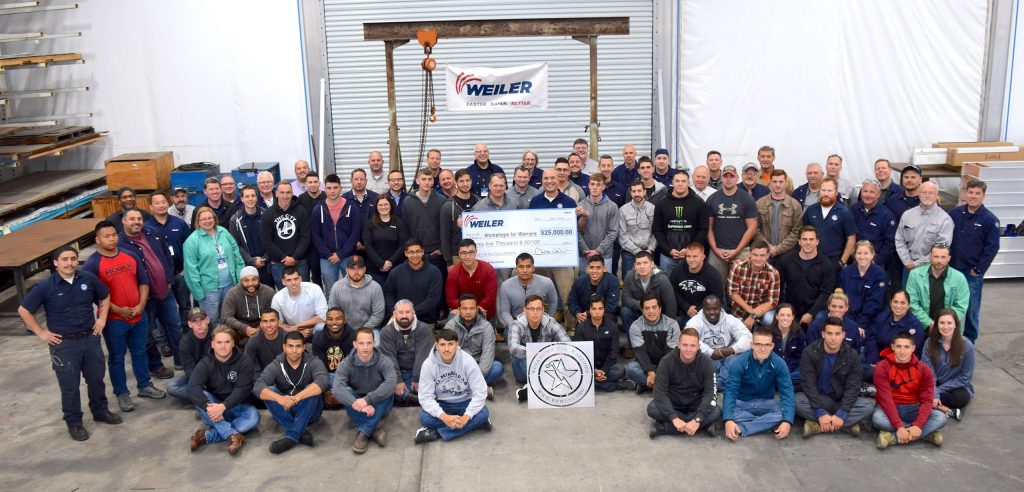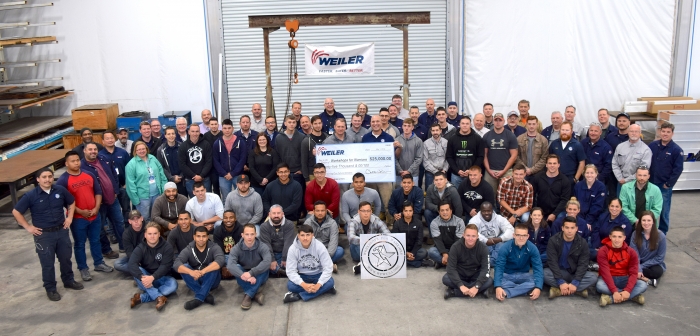Weiler Abrasives Group partners with Workshops for Warriors
Weiler Abrasives Group partners with Workshops for Warriors
Weiler Abrasives Group announced the launch of a national fundraising campaign, Leading a Warriors' Charge, in partnership with Workshops for Warriors, a nonprofit school that trains, certifies and helps place veterans, wounded warriors and transitioning service members into advanced manufacturing careers. Weiler donated $25,000 to kick off the year-long campaign that will support machining and welding training programs at the nonprofit trade school, as well as contribute to long-term growth of the organization.

Article from Weiler Abrasives Group
Weiler Abrasives Group announced the launch of a national fundraising campaign, Leading a Warriors' Charge, in partnership with Workshops for Warriors, a nonprofit school that trains, certifies and helps place veterans, wounded warriors and transitioning service members into advanced manufacturing careers. Weiler donated $25,000 to kick off the year-long campaign that will support machining and welding training programs at the nonprofit trade school, as well as contribute to long-term growth of the organization.

"Weiler believes in the value of the Workshops for Warriors cause and is pleased to support it," says Nate Schmid, director of marketing — Americas, Weiler Abrasives Group. "Bringing veterans back into the workforce after they have served and training them with skills to have careers in welding and CNC machining is so important, both for their livelihoods and for our industry, as we face a major gap in the technical trades across the U.S."
Workshops for Warriors solves two systemic issues: rebuilding America's advanced manufacturing talent workforce and ensuring transitioning service members and veterans successfully transition into viable, upwardly mobile civilian careers.
Weiler has been providing Workshops for Warriors with in-kind support since 2014, supplying abrasive products and safety products to meet the needs of every incoming class each semester. The company plans to continue offering this support. Weiler will also be showing its ongoing support for Workshops for Warriors through Leading a Warriors' Charge, a nationwide fundraising campaign that includes promotion at trade shows, partnership-branded product packaging and more.
"Weiler has been a great supporter of ours since the outset," says Lyle Palm, dean of welding at Workshops for Warriors. "They've gone the extra mile with this campaign. It's an honor to partner with a company that genuinely believes in what we're doing."
Recognized as a leader in advanced manufacturing training for veterans in the United States, the Workshops for Warriors program is a nationally scalable and repeatable model that enables veterans and transitioning service members to overcome employment obstacles and enter into lucrative careers as welders, fabricators, CNC machinists, CNC mill and CNC lathe operators, computer-aided designers and CNC programmers.
Since its inception in 2008, Workshops for Warriors has trained and certified 496 veterans, wounded warriors and transitioning service members, awarding more than 3,000 nationally recognized third-party credentials. In 2017, 94 percent of the school's graduates obtained jobs in advanced manufacturing after completing the program.
Through the Leading a Warriors' Charge campaign, Weiler will garner support to enable Workshops for Warriors to train four times as many students—and help the organization achieve its goal of "Rebuilding American Manufacturing One Veteran at a Time."





